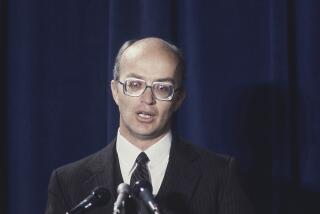The Buck Stops--Or Has It? : Poindexter Is Guilty; History May Be Tough With Reagan
- Share via
In the end, a jury held former National Security Adviser John M. Poindexter to his word. When the smoke cleared and the many pieces of the Iran-Contra scandal fell into place, the proverbial buck stopped with Poindexter rather than his former boss, Ronald Reagan.
That’s precisely what Poindexter himself said only weeks after the scandal first became public. “The buck stops here with me,” the retired admiral defiantly told a congressional committee. “I made the decision. . . . I was convinced that the President would in the end think it was a good idea, but I did not want him to be associated with it.”
Still, it was to promote goals Reagan cared about deeply--freeing American hostages in the Middle East and toppling Nicaragua’s Sandinista government--that Poindexter and underlings like Marine Lt. Col. Oliver L. North conspired to sell weapons to the radical regime in Iran and then used the profits to support the Contras.
And it was to protect Reagan from the political consequences of those actions--the fact most Americans opposed selling weapons to the Ayatollah and never really supported the covert war against Nicaragua--that Poindexter, North and others tried to cover up their activities by destroying government documents and lying to Congress.
Ironically, Poindexter’s trial will be most remembered in the short term for the way Reagan testified that he knew little, and remembered even less, of one of the worst scandals of his eight years in the White House. No one who saw that sad, befuddled performance on videotape could honestly feel sorry that the once-popular Reagan is no longer in residence there.
So while Poindexter will remain the highest ranking official found guilty as a result of the Iran-Contra scandal, it is Reagan who will be tainted by the verdict. For no matter how noble Reagan’s goals were, what his appointees did to pursue them is simply not acceptable in an open, democratic government. And, even allowing for the fact secrecy is sometimes necessary in matters of national security, open government is still the kind Americans prefer.
More to Read
Sign up for Essential California
The most important California stories and recommendations in your inbox every morning.
You may occasionally receive promotional content from the Los Angeles Times.













